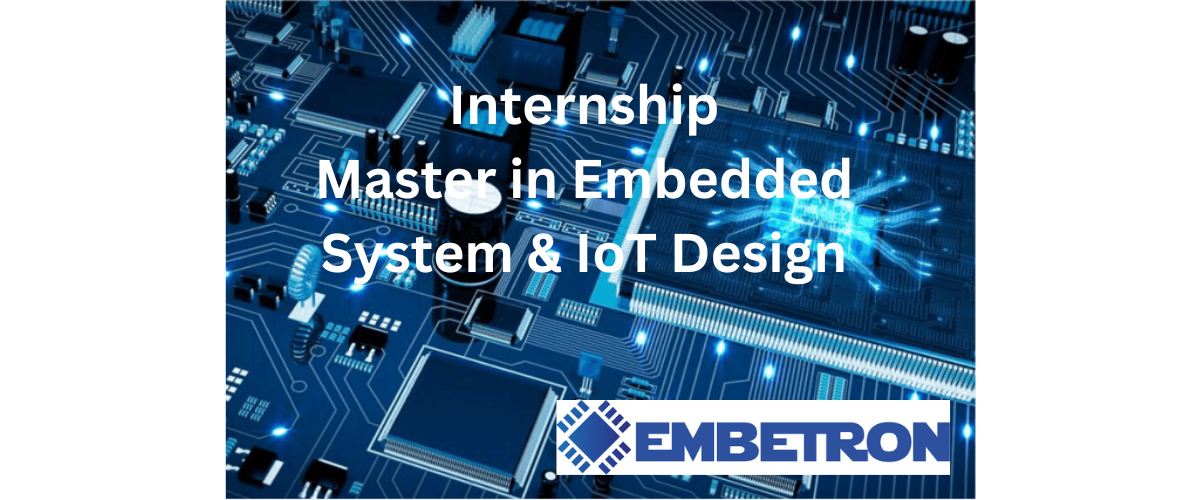Master in Embedded C Programming
Click Here for Detailed Content
Embedded systems are specialized computing systems integrated into various devices and products, from consumer electronics to automotive control systems, industrial machines, and medical devices. Embedded C programming is a crucial skill for professionals in this field.
Master in Embedded System Architecture
Click Here for Detailed Content
Embedded systems are self-contained devices with a dedicated purpose. We come across a variety of fields of applications for embedded systems in industries such as automotive, telecommunications, healthcare and consumer electronics, just to name a few. Embedded Systems Architecture begins with a bird’s eye view of embedded development and how it differs from the other systems that you may be familiar with.
You will first be guided to set up an optimal development environment, then move on to software tools and methodologies to improve the work flow. You will explore the boot-up mechanisms and the memory management strategies typical of a real-time embedded system. Through the analysis of the programming interface of the reference microcontroller, you’ll look at the implementation of the features and the device drivers. Next, you’ll learn about the techniques used to reduce power consumption. Then you will be introduced to the technologies, protocols and security aspects related to integrating the system into IoT solutions. By the end of this course, you would have explored various aspects of embedded architecture, including task synchronization in a multi-threading environment, and the safety models adopted by modern real-time operating systems.
Master in Internet of Things
Click Here for Detailed Content
his course is targeted for the software developers and designers with experience in different fields, who are willing to learn about embedded systems. Beginners and less experienced embedded programmers can extend their knowledge in specific areas of development. More experienced embedded software engineers might be inspired by the discussion points raised in the course, particularly about safety, secure connectivity, and energy efficiency for the next generations of embedded systems.
There are certain software/hardware skills which can prove beneficial for developers in an IoT environment. Being a software developer allows a professional to program in various languages ranging from low-level assembly languages like C or C++ to high-level languages such as Java or Node.js. Besides these, the knowledge of communication protocol is also required. As far as the knowledge of hardware is concerned, one must have a basic understanding of electronics. To know how basic components such as capacitors, resistors, and LEDs work in a circuit is quite important. In addition to basic hardware and software knowledge, an IoT developer must be able to read data sheets, and have a knowhow of timing diagrams, clocking, logic gates and transistors. Apart from software and hardware engineers, there are IT professionals, designers and solution architects who can become IoT Developers. Fresh IT graduates can also opt for a career in IoT Development.
Master in Linux Programming
Click Here for Detailed Content
The Linux OS and its embedded and server applications are critical components of today’s key software infrastructure in a decentralized and networked universe. Industry demand for proficient Linux developers is ever-increasing. This course aims to give you two things: a solid theoretical base, and practical, industry-relevant information—illustrated by code—covering the Linux system programming domain. This course delves into the art and science of Linux system programming, including system architecture, virtual memory, process memory and management, signaling, timers, multithreading, scheduling, and file I/O.
This course attempts to go beyond the use API X to do Y approach; it takes pains to explain the concepts and theory required to understand the programming interfaces, the design decisions, and trade-offs made by experienced developers when using them, and the rationale behind them.
Troubleshooting tips and industry best practices round out the course’s coverage. By the end of this course, you will have the conceptual knowledge, as well as the hands-on experience, needed for working with Linux system programming interfaces.
Master in Rust Programming
Click Here for Detailed Content
Over 300 of the biggest companies in the world reportedly use Rust in their tech stacks, including Dropbox, Sentry, and Brilliant. Rust is mostly used if you are looking for work in project types such as web development, systems programming, and CLI tools. In this course, you will build multiple complex programs from scratch for your portfolio! In these projects, you will learn how to think and properly develop your ideas into written code, including how to maximize your time.
You will master the Rust fundamentals: variables, if/else, operators, Boolean logic, String Object, functions, arrays, modifiers, macros, loops, strings, vectors, object handling, concurrency, memory allocation, stack versus the heap, and more. You will understand Rust from the beginning: public and private visibility, struct and enums, special macros and variables, functions, Hash, Maps, and more. Additionally, you will also see how Rust works behind the scenes: memory safety and data races, events and error handling, scoping, threading, and more.
Next, we will deep dive into functions, methods, closures, recursion, main function, and more. Finally, you will deep dive into object-oriented programming: Structs and Enum building from scratch, Generic Types, and traits for libraries and modules.
By the end of the course, you will have the knowledge and confidence that you need to ace your Rust job interviews and become a developer for programming in Rust.
Mentorship
- Building a Portfolio of Embedded Projects.
- Networking and Industry Engagement.
- Preparing for Interviews and Career Opportunities.
- Encouraging Ongoing Professional Development.
- Celebrating Achievements and Growth.





Reviews
There are no reviews yet.